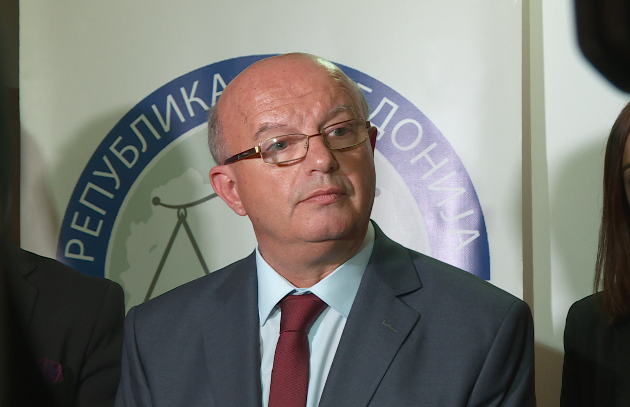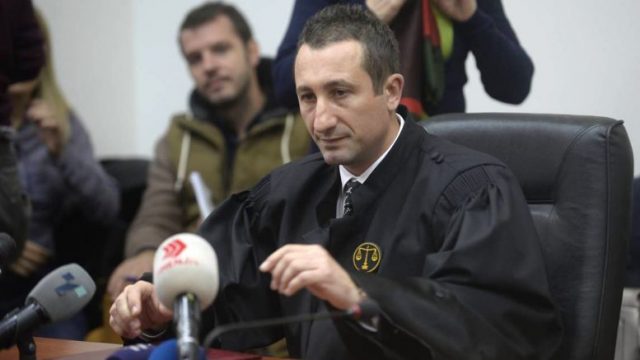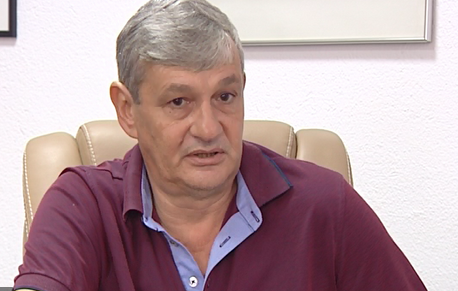As a seemingly ordinary case, from those of SPO beginning with T, it has become a judicial priority to speak to the lawyer of one of the defendants in the case, former Minister of Transport and Communications Mile Janakieski, Elenko Milanov.
TNT
The TNT case was announced in April 2016, which involves abuse of power and authority. According to the indictment, former Prime Minister Nikola Gruevski and Minister of Transport and Communications Mile Janakieski have asked Gazi Baba Mayor Toni Trajkovski to illegally demolish Fiat Canoski’s Cosmos building. A construction inspector from the municipality of Gazi Baba is also charged in the case.
Just before New Year’s Eve, Milanov announced that after the holidays he would file criminal charges of abuse of power and false representation. Meanwhile, juror Kockovska, who in addition to TNT, is also a juror in few more SPO’s cases, resigned, but her resignation was not accepted; The Criminal Court entered into correspondence with the defense, in which it generally blamed the defenders in the TNT case on multiple grounds; a reassigned judge in another department will stay on SPO cases so they are not returned back to the beginning (Judge Zeneta Begtovic, who is judging in two SPO cases, “Target-Fortress” and “Treasure”, has been reassigned from organized to criminal adult), and President Dzolev says Judge Begtovic will complete these cases, avoiding the possibility that the trials will be returned back to the beginning, and earlier the “Torture” trial was returned back to the beginning because a lay judge resigned. .. What is happening in the Criminal Court?
What steps does the defense take, did you file criminal charges and who will be covered in the motion?
Milanov: The Criminal Court in its latest statement of 10 January 2020 on the different treatment of two jurors in two separate cases essentially acknowledged that the defense was right in its request that the juror Liljana Kockovska could not proceed in any court proceedings due to the expiry of her term of four years. We believe that if juror Ljiljana Kockovska attends the hearing on January 13, the legal assumptions will be fulfilled to be considered a criminal offense, which will see possible actions taken by filing criminal charges. As to against whom and when any harges will be filed, it will probably be decided by January 13.
Such developments have already been reported to several justice institutions and representatives of the international community, pointing out that they have acted in violation of the law by insisting on a lay judge whose term of office has expired to continue working in the case.

What is the role of the Judicial Council in this mess? What is the procedure to be followed by the Judicial Council to determine the expiry of the juror’s term? What after the verdict was rendered by a trial chamber with no decision-making mandate?
Milanov: Reaching a verdict by a trial chamber which is improperly composed with the participation of a lay judge who has no term, and thus the capacity of a lay judge is a substantial violation of Art. 415 p.1 t. 1 of the LCP, which in turn constitutes an absolute ground for revoking the verdict by the higher judicial instances upon appeals. Thus, instead of the efficiency of the procedure, the opposite effect of delaying the procedure is caused precisely because of the improper conduct of the court. In line with such an allegation, there are several court decisions brought by the Courts of Appeal and the Supreme Court.
I believe that in this particular case the President of the Skopje Basic Criminal Court is the first link who can clear this mess by informing the trial chamber that the juror’s term has expired as it did with the trial chamber dealing with the case on the accident that took place near the village of Lascarci with the appointment of a new lay judge to work in the TNT case.
The Judicial Council is the second link that can and must clear this mess because it elects and DISMISSES judges and lay judges by making formal written decisions. But here I must point out that in this case with the expiry of the term of office, ie the termination of the term of a lay judge, the Judicial Council does not make any formal legal decision since the expiry of the term is a fact of time passed in which an elected official can perform the function. Even if it conforms the fact of the expiry of the term, the Judicial Council does not make any formal or written decision on it, and the conclusion must be that the term ended with the expiry of the term of office, and in this case it is until 24.12.2019. According to the Law on Courts and the Law on the Judicial Council there is no specific procedure for confirming the expiry of term of office, but there are only DISMISSAL procedures when the legal assumptions of the Law on Courts are fulfilled. Contrary to anyone being elected a lay judge, there is a procedure in which a written decision is made about the election and the beginning of the office by specifying the persons to whom that election applies, which is also published in the Official Gazette of the Republic of Macedonia.
I believe that the trial chamber in this case is the one to inform the President of the Court that a jury with expired term cannot act in any court case as the only legally-based resolution of the particular situation.
The president’s request for extension of the term of juror Liljana Kockovska has no legal basis. First of all, this juror is over 60 years old, which can neither compete nor be selected as a lay judge. Second, no law recognizes the extension of a lay judge’s term but merely the election of a statutory prescribed term of validity or dismissal by complying with specifically prescribed legal requirements. Third, the election of a lay judge is followed by a call and procedure that ends with an election decision, not at the request of a court president or any other person from the judicial or state institutions.

Why is the TNT case profiled as a priority despite other dozens of SPO cases, Monster, for example?
Milanov: Regarding your question why precisely the TNT case was chosen as a priority, you really should look the answer at the Basic Criminal Court Skopje. This case is in no way more important or less important than any other case that has the problem of having the same lay judge in the case. Is it possible to find a reason for the fact that there was a criminal case for the illegal construction of the “Kosmos” building before the same court, which after the filed and approved indictment by the Basic Public Prosecutor’s Office Skopje at the stage of the main hearing being scheduled was taken over by the SPO with a written notice about taking over the case and in few days without insight into the case files or a main hearing a withdrawal of the SPO indictment was submitted, a situation that is beyond any court practice or legal basis, I could not know or claim. However, it is a judicial precedent that I have not met in my practice of more than 30 years in criminal cases.
On the other hand, it may be symptomatic that the defendant in the case Ardijan Amzovski is a signatory to a Contract for the construction of retirement homes with the International Association, whose President is Bojan Jovanovski – Boki 13 charged in the cases known as “Racket” by paying more than 200,000 euros, so the priority is to complete the TNT case before testimonies of defendants in the “Racket” case can only be the subject of speculation for which you should still seek answers at the Skopje Basic Criminal Court.
I really would not like to believe as a legalist that all this may be of any political interest in insisting on completing the TNT case in the hope that the judiciary in our country has not fallen so low.
Will the procedure really be effective if hearings are held daily in two weeks? What is an efficient procedure?
Milanov: Regarding the question of whether the procedure will really be effective if hearings are held daily in two weeks, I personally cannot really see the effectiveness they insist on. This is a procedure that has a great deal of evidence, a large number of witnesses that require preparation by the prosecution, the defendants and the defense as well as by the trial chamber itself.
Especially given that there are more than 30 court decisions of the regular courts in all judicial instances or administrative courts in all administrative-judicial instances as well as decisions of first and second instance administrative authorities that have completed establishing the facts that the “Kosmos” building was built outside the approved project and the issued building permit.
In such conditions of overwhelming evidence, we find that there can be no efficient procedure by holding daily main hearings by clearing out all legally relevant facts to reach a proper and law-based judgment. All the tension over the proceedings, in my personal conviction, can only lead to insufficient clearance of all legally relevant facts to reach a fair judgement based on the true content of the evidence presented.
An efficient procedure is a procedure in which all parties in the proceedings will have sufficient time and space to present all their arguments by presenting evidence in support of their allegations by presenting all legally relevant facts to the trial chamber in order to be able make a proper and lawful decision which, because of its regularity, may be upheld by the higher judicial instances on the occasion of the parties’ appeals. Any pressure action at the time when a judgment will be rendered without clearing all the facts relevant to such a decision, which in many cases lead to retrial because of unclear circumstances, means only delaying the procedure, not an efficient procedure.
Can we talk about an efficient procedure when due to omissions now the “Monster” case returned to trial, which due to violations in a hasty procedure is now canceled and returned to trial again, can we talk about an efficient procedure in the “Titanic 2” case, which is now canceled and returned to trial again.
Finally, can we talk about an efficient TNT case if the legal presumption is that the case due to an improperly composed trial chamber with a lay judge with expired term at the time of making the court decision and therefore should be returned to retrial.
Again, I do not want to believe that all this may be matter to any interference of personal or political interests at the expense of the judicial system as a third authority necessary for the survival of a state and its statehood.
By: Katerina Mitik






Comments are closed for this post.